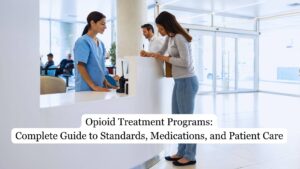Detox is the first and often most difficult stage of addiction treatment. During this phase, the body works to eliminate substances, which can lead to uncomfortable or dangerous withdrawal symptoms. To facilitate this process, healthcare providers may utilize specific medications that help manage withdrawal, stabilize patients, and enhance safety.
This article outlines the most common medicines used during drug detox and explains how they support recovery.
Medications for Opioid Detox
Opioid withdrawal can be highly distressing, with symptoms such as muscle aches, nausea, anxiety, and intense cravings. Many individuals access medication-assisted treatment (MAT) through trusted addiction treatment facilities such as Raise the Bottom, where safe prescribing practices are prioritized.
To reduce the unpleasant effects of opioid cessation, methadone is often prescribed. As a long-acting treatment, methadone eases withdrawal without creating the same euphoric high and is tapered gradually under supervision. Buprenorphine, a partial agonist, is another effective option.
Vivitrol, an antagonist, works differently by blocking receptors and preventing the euphoric effects if relapse occurs. This medicine is usually started after detox to support long-term recovery and discourage future use.
Medications for Alcohol Detox
Alcohol withdrawal can be unpredictable and dangerous, making medical supervision critical. Severe cases may involve seizures or delirium tremens, a condition marked by confusion, hallucinations, and unstable vital signs. Benzodiazepines such as diazepam or lorazepam remain the standard treatment because they calm the nervous system and significantly reduce seizure risk. Once the acute phase passes, other medicines may be introduced to promote stability.
Acamprosate is frequently used to restore balance in brain chemistry and reduce cravings that fuel relapse. Disulfiram plays a different role by creating unpleasant physical reactions when alcohol is consumed, discouraging future use. Although not part of the initial detox, these medications help individuals transition into ongoing sobriety with stronger support.
Medications for Benzodiazepine Detox
Benzodiazepine detox is one of the more complex withdrawal processes and must be carefully managed. Abruptly stopping these medicines can trigger seizures or severe anxiety, so physicians often use a slow taper. Long-acting benzodiazepines like diazepam are used to replace shorter-acting ones, allowing doses to be gradually lowered without severe withdrawal spikes. This approach reduces discomfort while maintaining a measure of stability.
Anticonvulsant medications are added to further reduce seizure risk, particularly for long-term or heavy users. Continuous monitoring ensures that the taper is safe and that patients remain stable throughout detox. This slow, deliberate process underscores the importance of professional oversight when managing benzodiazepine withdrawal.

Medications for Stimulant Detox
Stimulants such as cocaine and methamphetamine rarely cause life-threatening withdrawal, but the symptoms can still be overwhelming. Many individuals experience deep fatigue, depression, and cravings that make sobriety difficult to sustain. To address these challenges, antidepressants are sometimes prescribed to stabilize mood and reduce feelings of hopelessness.
Modafinil may also be used to combat fatigue and help patients stay alert during the early stages of recovery. Where stimulant use has led to psychosis, short-term use of antipsychotic medicines can reduce hallucinations, paranoia, and agitation. Together, these treatments ease the emotional and physical toll of stimulant withdrawal, making it easier for patients to remain engaged in long-term treatment.
Supportive Medications During Detox
Substance-specific drugs and supportive medicines often play a vital role in detox. Clonidine is commonly used during opioid withdrawal to relieve anxiety, sweating, and restlessness, helping patients remain more comfortable. Anti-nausea medications are often provided to reduce vomiting and dehydration, allowing individuals to stay nourished and hydrated.
Sleep problems are another frequent challenge, and short-term sleep aids may be prescribed to restore normal rest patterns. These supportive measures do not directly address the substance itself, but they reduce the discomfort that often drives relapse.
Final Thoughts from Raise the Bottom
Drug detox is a delicate medical process that requires planning, oversight, and tailored treatment. The right medications can reduce health risks, ease withdrawal, and create a foundation for long-term recovery. Each medicine must be selected with care, based on the patient’s history, health, and specific substance use.
At Raise the Bottom, patients receive evidence-based care designed to prioritize safety and comfort. With professional supervision, access to medication-assisted treatment, and personalized recovery planning. Our programs equip individuals with the tools to begin their path toward lasting sobriety and a healthier life.






